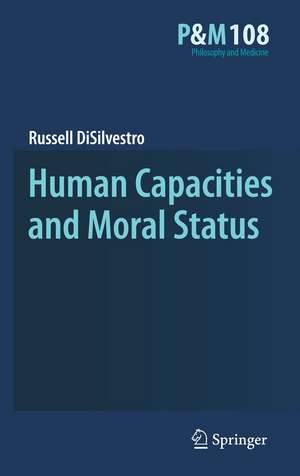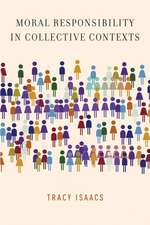Human Capacities and Moral Status: Philosophy and Medicine, cartea 108
Autor Russell DiSilvestroen Limba Engleză Paperback – 5 sep 2012
| Toate formatele și edițiile | Preț | Express |
|---|---|---|
| Paperback (1) | 636.80 lei 6-8 săpt. | |
| SPRINGER NETHERLANDS – 5 sep 2012 | 636.80 lei 6-8 săpt. | |
| Hardback (1) | 643.00 lei 6-8 săpt. | |
| SPRINGER NETHERLANDS – 25 iun 2010 | 643.00 lei 6-8 săpt. |
Din seria Philosophy and Medicine
- 18%
 Preț: 3071.11 lei
Preț: 3071.11 lei - 18%
 Preț: 789.52 lei
Preț: 789.52 lei - 15%
 Preț: 644.95 lei
Preț: 644.95 lei - 18%
 Preț: 949.23 lei
Preț: 949.23 lei - 18%
 Preț: 949.23 lei
Preț: 949.23 lei - 18%
 Preț: 948.79 lei
Preț: 948.79 lei - 18%
 Preț: 1223.74 lei
Preț: 1223.74 lei - 18%
 Preț: 1383.94 lei
Preț: 1383.94 lei - 18%
 Preț: 945.30 lei
Preț: 945.30 lei - 5%
 Preț: 1103.95 lei
Preț: 1103.95 lei - 18%
 Preț: 1130.45 lei
Preț: 1130.45 lei - 15%
 Preț: 644.49 lei
Preț: 644.49 lei - 18%
 Preț: 948.61 lei
Preț: 948.61 lei - 15%
 Preț: 645.60 lei
Preț: 645.60 lei - 5%
 Preț: 1154.22 lei
Preț: 1154.22 lei -
 Preț: 395.85 lei
Preț: 395.85 lei - 15%
 Preț: 643.34 lei
Preț: 643.34 lei - 18%
 Preț: 1227.04 lei
Preț: 1227.04 lei - 15%
 Preț: 640.55 lei
Preț: 640.55 lei - 5%
 Preț: 1092.79 lei
Preț: 1092.79 lei -
 Preț: 389.70 lei
Preț: 389.70 lei - 24%
 Preț: 780.11 lei
Preț: 780.11 lei - 15%
 Preț: 642.36 lei
Preț: 642.36 lei - 20%
 Preț: 557.45 lei
Preț: 557.45 lei - 15%
 Preț: 643.16 lei
Preț: 643.16 lei - 15%
 Preț: 639.59 lei
Preț: 639.59 lei -
 Preț: 385.08 lei
Preț: 385.08 lei - 15%
 Preț: 644.95 lei
Preț: 644.95 lei - 15%
 Preț: 642.51 lei
Preț: 642.51 lei
Preț: 636.80 lei
Preț vechi: 749.19 lei
-15% Nou
Puncte Express: 955
Preț estimativ în valută:
121.86€ • 126.46$ • 101.86£
121.86€ • 126.46$ • 101.86£
Carte tipărită la comandă
Livrare economică 15-29 martie
Preluare comenzi: 021 569.72.76
Specificații
ISBN-13: 9789400732537
ISBN-10: 9400732538
Pagini: 224
Ilustrații: XIV, 208 p.
Dimensiuni: 155 x 235 x 12 mm
Greutate: 0.32 kg
Ediția:2010
Editura: SPRINGER NETHERLANDS
Colecția Springer
Seria Philosophy and Medicine
Locul publicării:Dordrecht, Netherlands
ISBN-10: 9400732538
Pagini: 224
Ilustrații: XIV, 208 p.
Dimensiuni: 155 x 235 x 12 mm
Greutate: 0.32 kg
Ediția:2010
Editura: SPRINGER NETHERLANDS
Colecția Springer
Seria Philosophy and Medicine
Locul publicării:Dordrecht, Netherlands
Public țintă
Professional/practitionerCuprins
You Are Not What You Think: Capacities, Human Organisms, and Persons.- Anything You Can Do, I Can Do Also: Humans, Our Capacities, and the Powers We Share.- The Only Game in Town: Why Capacities Must Matter Morally.- Little People: Higher-Order Capacities and the Argument from Potential.- Not Just Damaged Goods: Higher-Order Capacities and the Argument from Marginal Cases.- Old Objections and New Directions: Capacities and Moral Status at the Very Borders of Human Life.
Textul de pe ultima copertă
Many debates about the moral status of things—for example, debates about the natural rights of human fetuses or nonhuman animals—eventually migrate towards a discussion of the capacities of the things in question—for example, their capacities to feel pain, think, or love. Yet the move towards capacities is often controversial: if a human’s capacities are the basis of its moral status, how could a human having lesser capacities than you and I have the same "serious" moral status as you and I? This book answers this question by arguing that if something is human, it has a set of typical human capacities; that if something has a set of typical human capacities, it has serious moral status; and thus all human beings have the same sort of serious moral status as you and I. Beginning from what our common intuitions tell us about situations involving "temporary incapacitation"—where a human organism has, then loses, then regains a certain capacity—this book argues for substantive conclusions regarding human fetuses and embryos, humans in a permanent vegetative state, humans suffering from brain diseases, and humans born with genetic disorders. Since these conclusions must have some impact on our ongoing moral and political debates about the proper treatment of such humans, this book will be useful to professionals and students in philosophy, bioethics, law, medicine, and public policy.
Caracteristici
Argues that all of a thing’s capacities are relevant to its moral status. Begins from the moral intuitions most people have when we become temporarily "incapacitated" as a result of repairable brain damage. Draws from ideas found in the moral frameworks of J. Rawls and M. Nussbaum. Interacts with influential contemporary approaches like those of R. George, J. Mc. Mahan, and M. Tooley. Applies conclusions to controversial moral debates regarding humans at the beginning and ending stages of life.


















